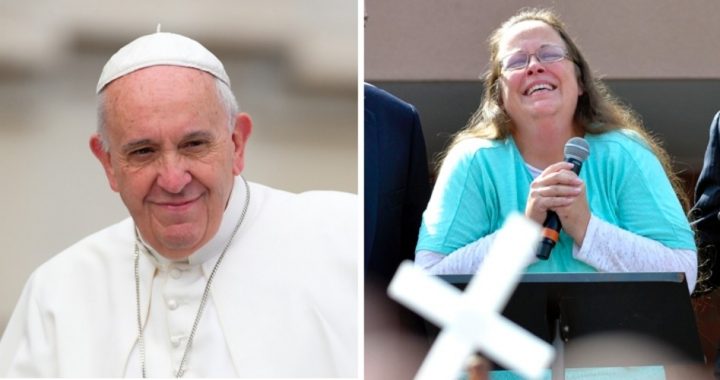
Kentucky clerk Kim Davis, who made national news for refusing to issue “marriage” licenses to same-sex couples, may not have many fans among the mainstream media. But it appears that at least one media darling is a fan of hers: Pope Francis.
It has just been reported that during his recent trip to the United States, the pope met with Davis face-to-face and offered her words of support. Writes Liberty Counsel:
The Pope met privately with Kim Davis and her husband, Joe, at the Vatican Embassy in Washington, D.C., on Thursday, September 24, which was the birthday of Kim’s father. Pope Francis spoke with Kim and Joe Davis in English.
During the meeting Pope Francis said, “Thank you for your courage.” Pope Francis also told Kim Davis, “Stay strong. He held out his hands and asked Kim to pray for him. Kim held his hands and said, “I will. Please pray for me,” and the Pope said he would. The two embraced. The Pontiff presented Kim and Joe Davis each with a Rosary that he personally blessed. Kim’s mother and father are Catholic, and Kim and Joe will present the Rosaries to her parents.
… Kim Davis said, “I was humbled to meet Pope Francis. Of all people, why me?” Davis continued, “I never thought I would meet the Pope. Who am I to have this rare opportunity? I am just a County Clerk who loves Jesus and desires with all my heart to serve him.” Kim said, “Pope Francis was kind, genuinely caring, and very personable. He even asked me to pray for him. Pope Francis thanked me for my courage and told me to ‘stay strong.'”
The original source of the story apparently is Catholic journalist Robert Moynihan, who resides in Rome. According to Moynihan, the meeting was kept secret because the “Vatican evidently feared the ‘politicization’ of a ‘pastoral trip’ which clearly wished to emphasize the encounter with Jesus Christ, with the poor, with the faithful, with the handicapped, with children, and with all Americans of whatever background.” Moynihan states that Davis gave him an account of the meeting shortly after it took place.
But would the objectives of the “pastoral trip” have been undermined if the Vatican had publicized the meeting with Kim Davis rather than keeping it a secret? Didn’t the meeting provide an opportunity for the pope to make clear to the world the Catholic position on homosexuality?
It had previously been reported that the pope voiced support for conscientious objection and religious-freedom rights, in an obvious allusion to the Davis case. But news of the meeting with the clerk, if accurate, will provide traditionalists with moral support, something they complain has been sorely lacking during Francis’ pontificate. As Matt C. Abbott writes at American Thinker, “This is heartening news, particularly because the mainstream media have been portraying — and will likely continue to portray — Pope Francis as a liberal icon. Granted, he’s made a number of remarks that have appealed to liberals (while angering conservatives), but Bernie Sanders he ain’t!”
What the pope is, is an interesting subject. Praised by the Left and pilloried by the Right, it’s clear he does have strong “left-wing” instincts, to use our modern political terminology. His support for the climate-change agenda, comments on immigration, and criticism of “capitalism” (a socialist-originated term that should be avoided; “economic freedom” is preferable) make this clear. Yet the media, partially out of ignorance and headline hunger and partially driven by deviousness, has taken this ball and run with it — and lied with it.
One problem of man’s nature is that people gravitate toward simple, and often simplistic, explanations for understanding the world and others. “We have our problems because of ______” or “He’s just that way because of ______.” But humans are complex beings, often defying simple definitions and categorizations, and Pope Francis is no exception. I will provide a few examples to illustrate this point and that of media malpractice.
Once again, any honest discussion of Francis cannot ignore his obvious “left-wing” tendencies; he’s clearly a product of his time and place (socialist Argentina). Yet he’s also constrained by Catholic teaching.
“Pope Francis assures atheists: You don’t have to believe in God to go to heaven,” proclaimed the 2013 Independent headline. The problem?
The pope said no such thing.
Not surprisingly, the Independent, perhaps momentarily independent of journalistic ethics, had suddenly forgotten how to use the hyperlink feature in its reportage on the pope, but here’s what Francis actually wrote. He never said “You don’t have to believe in God to go to heaven.” In fact, he never used the word “Heaven” in what was a 2,688-word letter — not even once.
Yet it is also true that Francis deserves some of the blame for the confusion sown. For instance, the media certainly were remiss in reporting that the pope said about abortion, faux marriage, and contraception, “it is not necessary to talk about these issues all the time” often without mentioning what preceded those words: “The teaching of the church, for that matter, is clear,” said Francis, “and I am a son of the church….” (Emphasis added.) The problem is that the pope’s actions and words have often made the teaching unclear in people’s minds.
The best example is Francis’ infamous off-the-cuff remark, supposedly about homosexuality, “Who am I to judge?” I say “supposedly” because the media generally took the answer out of context. The pope was talking about something very specific: priests who may have a homosexual inclination but nonetheless are living celibate lives. In this he merely reflected the Catholic teaching and not uncommon Christian understanding that while having the inclination is not sinful (it is “disordered”), acting upon it is. After all, we don’t choose our feelings, only our actions.
The problem, though, is a failure of understanding. Francis meant one thing, but “Who am I to judge” is an oft-used code phrase in the secular Western world meaning “Homosexual behavior is okay.” I don’t believe the pope understood this. He’s neither a native English speaker nor part of the Anglosphere’s cultural milieu. What he really needs is a good media advisor — and the willingness to listen to him.
The Christian Post provides seven examples of how the pope has been misquoted, and I expounded upon the issue here. Having said this, Pope Francis isn’t hard to understand; in fact, I once knew someone just like him. His instincts tend left but he’s also a faithful Catholic, meaning, he won’t deviate from the official teaching of his church. But in areas where the Catholic Church hasn’t spoken definitively — where he has wiggle room — he will virtually always embrace the liberal position. Moreover, his instincts indicate his passions; he thus will speak more often about, and generally more zealously about, “left-wing” positions than “right-wing” ones.
So it might be nice to have some moral clarity, to state about, let’s say, faux marriage, something such as, “We’re not talking about a simple political battle; it is a destructive pretension against the plan of God … a machination of the Father of Lies that seeks to confuse and deceive the children of God.” Yet this very statement was said. And it was said by Francis, in 2010, when he was a cardinal in Argentina.
So it’s no surprise the pope would support Kim Davis. It just would be nice if his support for the right things were as visible as his support for the wrong ones.
Photos of Pope Francis and Kim Davis: AP Images



